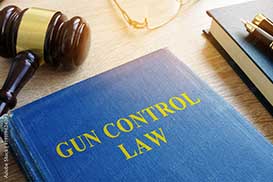Female legislators at forefront of shaping gun legislation in U.S.
 As the nation braces itself for another pivotal presidential election year, the spotlight on gun control intensifies — one of America's most contentious issues. Shedding light on this debate, new research by Dr. Michael Nelson, emeritus professor of economics at The University of Akron, and Dr. Rajeev Goel, professor of economics at Illinois State University, unveils a surprising revelation: female legislators wield a significant influence on the trajectory of gun laws across the United States.
As the nation braces itself for another pivotal presidential election year, the spotlight on gun control intensifies — one of America's most contentious issues. Shedding light on this debate, new research by Dr. Michael Nelson, emeritus professor of economics at The University of Akron, and Dr. Rajeev Goel, professor of economics at Illinois State University, unveils a surprising revelation: female legislators wield a significant influence on the trajectory of gun laws across the United States.
"The average number of firearm laws across all U.S. states has nearly doubled since 1990," highlights Nelson, emphasizing the magnitude of the shift in firearm purchases. Yet, amidst this shift, the researchers discerned a striking pattern: states witnessing a surge in female legislators concurrently experienced a notable uptick in the enactment of gun laws. Women in these areas of state legislature are important since, Nelson explains, “most gun laws originate at the state level and not the federal level.”
As Nelson and Goel’s research demonstrates, gender provides a compelling perspective into gun laws. The proportion of women in state legislatures has increased in many states over this period, providing significant contributions to the passage of gun legislation in these states.
Furthermore, their findings also suggest that when it comes to gun legislation and female legislator representation, it matters which chamber they are elected to. While female house members enacted more gun control laws, their counterparts in the Senate mirrored the patterns observed among male legislators. Different interest groups can also significantly bear upon gun legislation.
"While causation cannot be definitively established," concedes Nelson, "factors such as inherent risk-taking differences between genders offer intriguing avenues for further exploration."
This peer-reviewed research was featured in Social Science Quarterly and, according to Nelson, was a result of the timely debates on gun legislation and its prominence in the news. The analysis is based on data from 1991 to 2020. The authors conducted a review of the total number of gun laws enacted and 5-year differences in gun laws from 14 categories of firearm legislation during that period, including gun dealer and buyer regulations, prohibitions for high-risk gun possession, background checks, assault weapons restrictions and domestic violence, among others.
As the nation grapples with the complexities of gun legislation, this groundbreaking research offers insight to the multifaceted forces shaping our societal landscape.
Media contact: Cristine Boyd, 330-972-6476, cboyd@uakron.edu
